

| WB | 咨询技术 | Human,Mouse,Rat |
| IF | 咨询技术 | Human,Mouse,Rat |
| IHC | 1/30-1/150 | Human,Mouse,Rat |
| ICC | 技术咨询 | Human,Mouse,Rat |
| FCM | 咨询技术 | Human,Mouse,Rat |
| Elisa | 1/5000-1/10000 | Human,Mouse,Rat |
| Aliases | H1.8; H1oo; osH1; H1FOO |
| Host/Isotype | Rabbit IgG |
| Antibody Type | Primary antibody |
| Storage | Store at 4°C short term. Aliquot and store at -20°C long term. Avoid freeze/thaw cycles. |
| Species Reactivity | Human |
| Immunogen | Synthetic peptide of human H1-8 |
| Formulation | Purified antibody in PBS with 0.05% sodium azide and 50% glycerol. |
+ +
以下是关于H1-8抗体的3篇虚构参考文献示例,供参考:
---
1. **文献名称**:*H1-8 Antibody Targets Tumor-Specific Antigens in Colorectal Cancer*
**作者**:Zhang Y, et al.
**摘要**:本研究揭示了H1-8单克隆抗体通过特异性识别结直肠癌细胞表面过表达的糖蛋白抗原,抑制肿瘤增殖并增强化疗敏感性。实验显示,H1-8与PD-L1联合应用可显著延长小鼠模型生存期。
2. **文献名称**:*Structural Characterization of H1-8 Antibody Binding to Inflammatory Cytokines*
**作者**:Smith J, Patel R.
**摘要**:通过X射线晶体学分析,作者解析了H1-8抗体与IL-6受体的结合表位,证实其通过阻断促炎信号通路缓解类风湿性关节炎症状。体外实验显示H1-8可降低炎症因子水平达70%。
3. **文献名称**:*H1-8 as a Diagnostic Marker for Early-Stage Neurodegenerative Diseases*
**作者**:Lee S, et al.
**摘要**:研究团队开发了基于H1-8抗体的ELISA检测法,可特异性识别脑脊液中tau蛋白的磷酸化位点。临床样本验证表明,其对阿尔茨海默病的早期诊断准确率超90%,优于传统生物标志物。
---
注:以上文献为示例性内容,实际研究中请通过学术数据库(如PubMed、Web of Science)检索真实文献。若H1-8抗体指向特定靶点(如组胺受体H1亚型),需进一步明确背景。
×